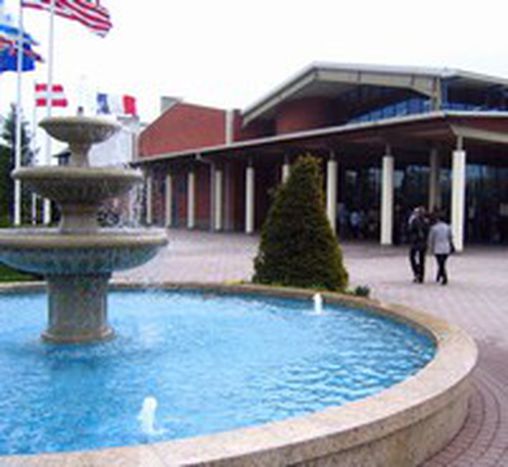
The Hungarian Megachurch
Published on
Translation by:
 akasemi newsome
akasemi newsome
Roughly 40,000 members of the Faith Church meet every week for lively and spirited sermons which are broadcast live on TV and the Internet. The growing influence of this religious community is unsettling for the Hungarian establishment.
Sunday, 10 am. It’s cold outside, so the “Happy Sunday” service (Vidám Vasárnap in Hungarian) has been moved from the stadium to the indoor convention centre. Masses of people snake their way towards Faith Park in Budapest - many are believers from rural villages and far-away towns that came into the capital on the convention buses sponsored by the church. In the back courtyard, the car parks are full of vehicles. Just in front of the huge buildings wave large colourful flags, leftover from the communist era.
Security guards mark each entrance, checking handbags and prodding with metal detectors as they look for guns. A group of young church aides in dark suits with slick gelled hair chat quietly in the foyer, where vendors sell CDs, books and Jesus t-shirts.
The saved and the hungry crowd about makeshift cafes, drawn to the smells of freshly made coffee and rolls. There’s also a long queue outside the ladies room as dozens of fashionably dressed young women dab lipstick and adjust their clothing before the mirrors. It feels as festive as a large wedding.
Yuppies at the front
Giant posters in the 5,000 seater great-hall implore people to donate the1 percent of their yearly income which must be dedicated to non-governmental organisations to the church. No mention is made of the fact that members are already required to tithe. In the first pews, you find the Yuppies - wealthy managers, stock market analysts and young politicians. The back rows house families as well as Sinti and Roma. Children run under the bleachers. Many in the audience have brought picnic baskets full of bread, biscuits and colouring books. “Happy Sunday” lasts from 10.30 am to 4 pm and keeping up the children’s spirits is a top priority.
Live on Hungarian TV
Several cameras train their lenses on the stage decorated with fresh flowers and draped with blue cloth. To the left is a choir and to right is the pulpit. Suddenly, a hush falls over the crowd. Sandor Nemeth, the founder of Faith Church opens the service. He is about 60-years-old and gives the impression of strength. His voice is aggressive, resonant; unthinkable for a western European church.
“Pastor Nemeth is the heart of the Faith Church,” says theologian Dr. Andras Mate-Toth from the Hungarian University of Szeged. Due to Nemeth’s simple but magnetic personality, this church grew from a small Christian cell to a following 40,000 strong. In the eighties, organised religion was banned by the state and believers were forced underground. Religious Hungarians published an underground newspaper that spoke about the disappointments of communism and called for resistance. Their daring in difficult times earned them the sympathy of the many Hungarians.
Today Pastor Nemeth is “Happy Sunday,” writing books and running the St. Paul Bible School and the Faith Secondary School with his wife. His organisation owns Faith Park in Budapest, including the convention centre; has shares in the Hungarian TV station ATV; owns a radio station and several schools; and has branches in 250 towns in the country. Needless to say, established churches and politicians have viewed his rise warily.
Jesus Christ Superstar
Sando Nemeth stands on the stage and reads from the Bible. Then he calls upon the congregation to sing and dance along with him. The hall moves to the sounds of the mini orchestra, which boasts violins, trumpets, electric guitars, harps, drums and human choruses. Ballads and folksongs, simple and melodic, continue for the next hour. Thousands take two steps to the left and two to the right and then clap. Young and old alike leap into the air, whistle, laugh hysterically and shriek; some even collapse. Wall-flowers dance without a care in the world. Many minutes later, the lights finally dim, and the music fades. People shake the hands of their neighbours and embrace. Men proceed down the aisles to collect the offerings. “This is Happy Sunday.”
Translated from Die ungarische Yuppiekirche


